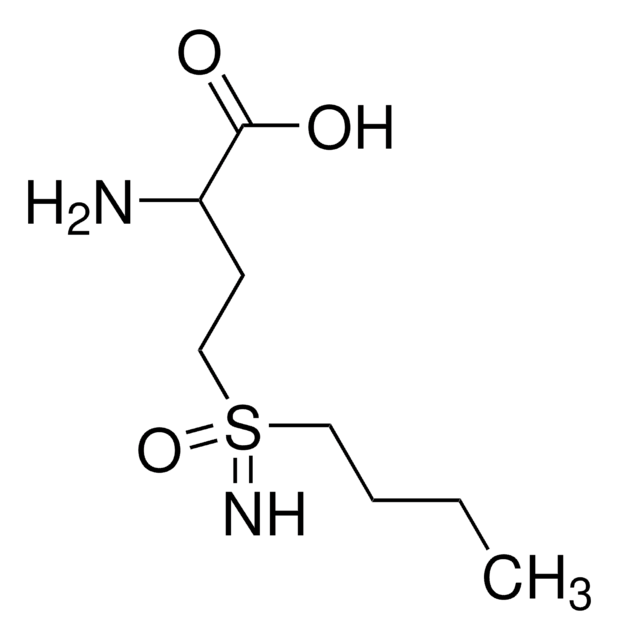19176
DL-Buthionine-sulfoximine
≥99.0% (TLC)
Synonym(s):
DL-Buthionine (S,R)-sulfoximine, BSO, Buthionine sulfoximine, Butionine sulfoximine
About This Item
Recommended Products
biological source
synthetic
Quality Level
Assay
≥99.0% (TLC)
form
powder or crystals
mp
215 °C
solubility
H2O: 50 mg/mL, clear to almost clear, colorless
storage temp.
2-8°C
SMILES string
CCCCS(=N)(=O)CCC(N)C(O)=O
InChI
1S/C8H18N2O3S/c1-2-3-5-14(10,13)6-4-7(9)8(11)12/h7,10H,2-6,9H2,1H3,(H,11,12)
InChI key
KJQFBVYMGADDTQ-UHFFFAOYSA-N
Application
- examine whether the inhibition of glutathione by BSO enhances the apoptotic effect of estrogen on antihormone-resistant human breast cancer cells
- investigate the effect of BSO on development of bovine embryos
- inhibit GSH in several studies
- investigate the effect of GSH synthesis on oocyte maturation
Biochem/physiol Actions
Other Notes
Signal Word
Warning
Hazard Statements
Precautionary Statements
Hazard Classifications
Eye Irrit. 2 - Skin Irrit. 2 - STOT SE 3
Target Organs
Respiratory system
Storage Class Code
11 - Combustible Solids
WGK
WGK 3
Flash Point(F)
Not applicable
Flash Point(C)
Not applicable
Personal Protective Equipment
Certificates of Analysis (COA)
Search for Certificates of Analysis (COA) by entering the products Lot/Batch Number. Lot and Batch Numbers can be found on a product’s label following the words ‘Lot’ or ‘Batch’.
Already Own This Product?
Find documentation for the products that you have recently purchased in the Document Library.
Customers Also Viewed
Our team of scientists has experience in all areas of research including Life Science, Material Science, Chemical Synthesis, Chromatography, Analytical and many others.
Contact Technical Service












